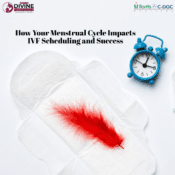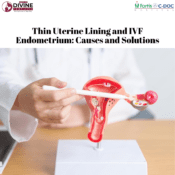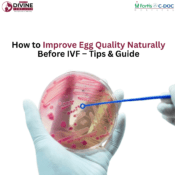

How to Improve Egg Quality Naturally Before IVF – Tips & Guide
1. Introduction
Preparing for an IVF journey can be a mix of hope, excitement, and understandable anxiety. For many women, this step represents months or even years of dreaming about starting or growing their family. If you’re considering IVF, you’ve likely come across the term “egg quality” more than once. And for good reason — the health of your eggs plays a critical role in your IVF success rate.
Whether you’re in your early 30s, over 40, or managing conditions like PCOS, improving egg quality is something you can work on. While age is an important factor, lifestyle, diet, and overall health can also influence how healthy your eggs are before IVF.
The good news? There are natural, science-backed strategies to give your eggs the best possible environment to thrive. This blog will guide you step-by-step on how to improve egg quality naturally before IVF, with tips you can start applying today.
2. Understanding Egg Quality
What Is Egg Quality?
Egg quality refers to the health of the eggs in your ovaries, particularly their ability to be fertilized and develop into a healthy embryo. Healthy eggs have the right number of chromosomes and enough energy to sustain early embryo development.
Why It Matters for IVF Success
In IVF, the egg’s health directly impacts fertilization, embryo development, and implantation. Even the best IVF centre in Delhi cannot guarantee results if egg quality is poor. Simply put — healthy eggs give you a better chance at a healthy pregnancy.
How Egg Quality Changes with Age
Women are born with all the eggs they’ll ever have. Over time, both the number and quality of these eggs decline. By age 35, this decline becomes more noticeable, and by age 40, the chances of poor-quality eggs are higher. But — and here’s the hopeful part — lifestyle, nutrition, and certain supplements can help maximize the potential of the eggs you still have.
3. Factors Affecting Egg Quality
1. Age and Ovarian Reserve
Age is the most significant factor. As ovarian reserve decreases, the proportion of abnormal eggs increases.
2. Lifestyle and Nutrition
Poor diet, lack of exercise, and unhealthy habits can negatively affect egg quality.
3. Medical Conditions
Conditions like PCOS, endometriosis, and thyroid disorders can disrupt ovulation and egg health.
4. Stress and Hormonal Balance
Chronic stress can cause hormonal imbalances, affecting egg maturation and ovulation cycles.
5. Environmental Toxins
Exposure to BPA, pesticides, and harmful chemicals can damage reproductive health.
4. Diet & Nutrition to Improve Egg Quality
Nutrition is the foundation of reproductive health. The best diet for egg quality before IVF should include:
- Leafy greens like spinach and kale for folate and antioxidants
- Berries for their high vitamin C and anti-inflammatory properties
- Whole grains for steady blood sugar and hormone regulation
- Healthy fats like avocado, nuts, and olive oil for hormone production
- Lean protein from fish, chicken, and legumes for cell repair
Antioxidants (like those in blueberries and green tea) fight free radical damage to eggs.
Hydration is also crucial — aim for at least 2 liters of water daily.
Foods to Avoid:
- Processed foods
- Sugary snacks and drinks
- Excess caffeine
- Trans fats
5. Supplements for Egg Health (Consult your doctor before starting)
1. CoQ10
Boosts mitochondrial function in eggs, especially beneficial for women over 35.
2. DHEA
Supports ovarian function, especially in women with low ovarian reserve.
3. Omega-3 Fatty Acids
Reduce inflammation and promote hormonal balance.
4. Folic Acid & Prenatal Vitamins
Essential for DNA synthesis and embryo development.
5. Vitamin D & B-Complex
Support reproductive hormones and overall fertility.
6. Lifestyle Changes to Enhance Egg Quality
- Maintain Healthy Weight – Both underweight and overweight can disrupt ovulation.
- Exercise Moderately – Brisk walking, yoga, or swimming can boost blood circulation to the ovaries.
- Manage Stress – Mindfulness, meditation, or counseling can regulate stress hormones.
- Limit Alcohol & Caffeine – Both can negatively affect fertility.
- Avoid Smoking – Smoking damages DNA in eggs.
7. Sleep & Stress Management
Sleep is your body’s repair time. Poor sleep can throw off hormonal cycles that influence ovulation. Aim for 7–8 hours of restful sleep.
Stress directly affects the brain-ovary connection, potentially delaying or preventing ovulation. Techniques like deep breathing, journaling, or guided meditation can help.
8. Avoiding Environmental Toxins
- Switch to BPA-free containers and avoid microwaving plastic.
- Choose natural, chemical-free cosmetics and cleaning products.
- Buy organic produce where possible to avoid pesticides.
9. Medical & Advanced Natural Support
- Acupuncture – Improves blood flow to the reproductive organs and supports hormonal balance.
- Herbal Remedies – Such as maca root or ashwagandha, but only under medical supervision.
- Fertility Massage – Encourages better blood circulation to ovaries and uterus.
10. Timeline: How Long Before IVF to Start Preparing
Ideally, start your egg-quality improvement plan 3–6 months before IVF. This gives your eggs time to mature under healthier conditions. Track your cycle, note changes, and keep your fertility clinic informed.
11. When to Consult a Fertility Specialist
See a fertility doctor if:
- You’re over 35 and haven’t conceived after 6 months of trying.
- You have known reproductive health issues.
- You’ve had previous IVF cycles with poor egg quality.
The best IVF centre in Delhi will also run tests like AMH levels to assess your ovarian reserve and suggest tailored treatment plans.
12. Conclusion
Improving egg quality is not about overnight miracles — it’s about consistently making healthy choices that give your eggs the best possible environment. With a nutrient-rich diet, targeted supplements, lifestyle adjustments, and support from a fertility clinic in Delhi, you can enhance your chances of IVF success.
Remember, every small positive change counts. Your journey is unique, and every step you take toward better health is a step closer to your dream of parenthood.





